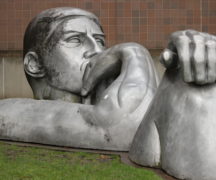In the early 1920s, a young disciple of Max Planck named Moritz Schlick has had enough of what he considers unjustified beliefs, not merely in the natural sciences, but also in philosophy, sociology, and psychology. He then took some ideas that had been put out a few years earlier by the philosopher Ludwig Wittgenstein in the latter’s book, Tractatus Logico-Philosophicus and developed what would be called “Logical Positivism”. Discarding the supernatural, ethics, and aesthetics, Schlick created a methodology that stated that the only meaningful statements were the ones which could be empirically verified. Schlick’s views would dominate the above-mentioned disciplines until the early 1970s when Bertrand Russell, the last great Logical Positivist, died. Today, virtually nobody thinks Logical Positivism had any merit, except perhaps those who are antagonistic towards religion. I predict Critical Race Theory will go the route of Logical Positivism. If your parents studied psychology back in the day, they were probably taught some variation of Behaviorism (a school of thought that was heavily influenced by Logical Positivism), a school which virtually nobody in the academy today adheres to. Critical Race Theory was unknown to the general population two years ago. Only due to recent events has it become popular to the point of being required learning for primary school students. Today it is considered “chic” but tomorrow, many of its current supports, both academic and laity, will scoff at it much like they do its predecessor in philosophy.
In 2015 I was introduced to Critical Race Theory via the writings and podcasts of Tommy J. Curry. I have also read some of the work of Derrick Bell while in law school. Primary school students are not missing anything. Since being introduced to the philosophers at BGSU in 2011, I have only heard of one person (a graduate student) who worked in CRT. This is not because there is a white supremacist conspiracy against having CRT promoted, but due to its lack of intellectual rigor.
As someone with a degree in philosophy as well as a solid background in history, I cannot recommend the writings of Derrick Bell, Bell Hooks, or Ibram X. Kendi. I can, however, recommend the works of Shelby Steele, Ward Connerly, Louis Pojman, Francis J. Beckwith, and Kevin Vallier as solid work on both race and political philosophy.
“But as for you, teach what accords with sound doctrine.”-Titus 2:1
Bill Kennedy IV, M.T.S.
Past President, BGSU Philosophy Club
Pemberville




